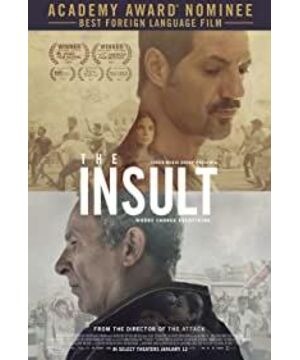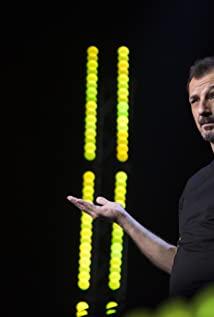"Shame" is Lebanese director Zed Dorry's fourth full-length feature film, and his new work after five years. This film poured into him a lot of ambition. While promoting it hard, he also cared very much about the audience's reaction. For example, in Telluride last year, after the screening he was eager to know whether the historical and political background interspersed with the whole film disturbed our understanding of the plot - the answer is naturally no.
No matter from the writing of the script, the setting of the characters, or the control of the shooting rhythm, the director and his team have presented the best version in his eyes very carefully. After careful "carving", "Shame" is a work with strong "craftsmanship". As a filmmaker who has lived in France for a long time and received American film training (he was Quentin's assistant photographer in his early years), Dory's handling of "Shame" actually has many traces of "Westernization"—— Apart from the story background, the look and feel of the whole film is not a typical "Middle Eastern film" or "foreign language film", but more like a "Hollywood" film. Perhaps because of this, this film representing Lebanon's "Olympic quest" feels extremely complete, with neat chapters, intricate details, fun and lingering aftertaste. What is even more rare is that the large lines do not make people feel "preaching" or violated.
In terms of script and dialogue, the director himself admitted that he has learned a lot from American legal dramas. Several court scenes are the core of the whole film. The director's "dramatic" and "interesting" handling of the characters and the simplification of unnecessary historical details have revitalized the process of accusation and defense that should have been boring and depressing. What we see is not the restoration of the courtroom scene, but the director cleverly used this debate space to carefully peel off a personal dispute that has risen to inter-ethnic hatred for us. With the deepening of the case, we also gradually discovered that the director's focus is not on the legal theory itself, but on how history has invisibly invaded and penetrated into everyone's consciousness and life, and how this invasion and penetration is lasting and irreversible. On the other hand, the court space is also civilized, with no contact with the outside world, no physical violence, and no unconscious incitement and blind obedience. The director focuses on introducing Lebanon to us with courtroom dramas, and intentionally blurs out the more bloody and unreasonable conflicts in the real society. I think it contains some "Hollywood"-style ideals and an identification with the power of individuality and reason.
The whole film starts from a small personal conflict, rises to two families, two ethnic groups, and two versions of history, and finally returns to the individual, to the basic right and wrong between people, good and evil, and self-esteem. Examining, it is really a "loopback" structure that is too neat and too ideal. Here, the director intentionally "kneaded" personal quarrels with political and ethnic hostility, facing social divisions and trying to dig deep into their incentives, while also maximizing the potential for "crack repair". The national concern and intellectual openness behind Doyle's creations can't be more evident here. In the end, the same "Hollywood-flavored" ending, the two people's mutual respect and tacit understanding, warmed their hearts to the point where people felt that social problems were just people's problems, and they seemed to be saying that compared with the settlement outside the court, The verdict in court is also less important. The end of the film is firmly on the individual. The two meet and "confront" again before the repair shop. Tony's return visit to his hometown of Damour is the process of their respective "rebirth".
The character setting of the movie must have been carefully considered. The two male protagonists are quite a bit of a "Hector-Achilles"-style binary opposition. However, they also have their own mature and serious sides, such as the pursuit of excellence in work and the sense of responsibility for the family, as well as the scorn of cheap "Made in China" parts. These commonalities all paved the way for mutual forgiveness later. The father-daughter relationship between the two lawyers adds a lot of "interest" to the court debate, but the relationship itself may represent the evolution of the conflicting attitudes towards ethnic groups. It is difficult to say who is right and who is wrong, but it has always been inherited and developed. This father-daughter relationship (especially the role of the daughter) and another dark thread of the film - Tony's wife giving birth to their child safely - together, highlight the director's expectations for the future and his sincere hope for the "next generation".
The sound and light effects of this film are also very good, with bright colors and crisp camera movement, showing us a lively Lebanon. What is commendable is the director's grasp of the moving and still rhythm of the film, which perfectly echoes the brutal political and national ecology in this country, as well as everyone's ordinary heart to seek stability and relief behind the turbulent social turbulence. The interaction between movement and stillness is also displayed inside and outside the courtroom. No matter how quick-thinking and articulate lawyers and judges are, it is difficult to further promote the process of "victims" healing their memories and reconciling with the past. Trial decisions can be made quickly, but Recovery from trauma may take a generation away. In the end, I think this contest between movement and stillness is still happening between politics and art. The active and surging social movement seems to be prosperous, with loud slogans, but in the end it breeds more mutual distrust and hatred. After thinking about it, let us calm down and watch a movie for two hours, just watch and listen, and say nothing, but it seems to be more active and effective. When asked if film and art can change society, Zed Doyle also waved his hand and said "no", but there's nothing wrong with thinking about it, because in many cases it's not society that needs to be changed, but us.
View more about The Insult reviews











